#Azure DevOps Test Plans
Text
Explore Azure DevOps Test Plans for seamless test management. Learn how AnArSolutions leverages this tool to streamline testing processes and enhance software quality.
0 notes
Text
Azure DevOps certification is a highly sought-after certificate in the field of cloud computing and software development
Azure DevOps certification is a highly sought-after certificate in the field of cloud computing and software development. It verifies a candidate's skills in using Azure DevOps tools and services to plan, develop, test, and deliver software products.
The certification process consists of a single exam (AZ-400) that covers topics such as agile planning and portfolio management, continuous integration and delivery, testing, and security. The exam is designed to test a candidate's ability to implement DevOps processes, use Azure services to manage infrastructure and applications, and implement continuous feedback.
There are several benefits to obtaining an Azure DevOps certification. Firstly, it demonstrates a professional level of expertise in DevOps practices, which can increase your credibility and marketability in the job market. Secondly, it showcases your ability to use Azure DevOps services to deliver high-quality software quickly and efficiently, making you a valuable asset to any organization.
To prepare for the AZ-400 exam, candidates can take advantage of a variety of resources, including online courses, hands-on labs, and official Microsoft training materials. It is recommended to have prior experience in software development, testing, and deployment processes, as well as an understanding of Agile and Scrum methodologies.
In conclusion, the Azure DevOps certification is a valuable addition to any software professional's credentials, as it demonstrates a comprehensive understanding of DevOps practices and the ability to use Azure services to deliver high-quality software.
#Azure DevOps#certification#cloud computing#software development#exam (AZ-400)#agile planning#portfolio management#continuous integration#delivery#testing#security#DevOps processes#Azure services#continuous feedback#expertise#credibility#marketability#job market#valuable asset#online courses#hands-on labs#official Microsoft training materials#deployment processes#Agile#Scrum methodologies
0 notes
Text
Azure DevOps Training
Azure DevOps Training Programs

In today's rapidly evolving tech landscape, mastering Azure DevOps has become indispensable for organizations aiming to streamline their software development and delivery processes. As businesses increasingly migrate their operations to the cloud, the demand for skilled professionals proficient in Azure DevOps continues to soar. In this comprehensive guide, we'll delve into the significance of Azure DevOps training and explore the myriad benefits it offers to both individuals and enterprises.
Understanding Azure DevOps:
Before we delve into the realm of Azure DevOps training, let's first grasp the essence of Azure DevOps itself. Azure DevOps is a robust suite of tools offered by Microsoft Azure that facilitates collaboration, automation, and orchestration across the entire software development lifecycle. From planning and coding to building, testing, and deployment, Azure DevOps provides a unified platform for managing and executing diverse DevOps tasks seamlessly.
Why Azure DevOps Training Matters:
With Azure DevOps emerging as the cornerstone of modern DevOps practices, acquiring proficiency in this domain has become imperative for IT professionals seeking to stay ahead of the curve. Azure DevOps training equips individuals with the knowledge and skills necessary to leverage Microsoft Azure's suite of tools effectively. Whether you're a developer, IT administrator, or project manager, undergoing Azure DevOps training can significantly enhance your career prospects and empower you to drive innovation within your organization.
Key Components of Azure DevOps Training Programs:
Azure DevOps training programs are meticulously designed to cover a wide array of topics essential for mastering the intricacies of Azure DevOps. From basic concepts to advanced techniques, these programs encompass the following key components:
Azure DevOps Fundamentals: An in-depth introduction to Azure DevOps, including its core features, functionalities, and architecture.
Agile Methodologies: Understanding Agile principles and practices, and how they align with Azure DevOps for efficient project management and delivery.
Continuous Integration (CI): Learning to automate the process of integrating code changes into a shared repository, thereby enabling early detection of defects and ensuring software quality.
Continuous Deployment (CD): Exploring the principles of continuous deployment and mastering techniques for automating the deployment of applications to production environments.
Azure Pipelines: Harnessing the power of Azure Pipelines for building, testing, and deploying code across diverse platforms and environments.
Infrastructure as Code (IaC): Leveraging Infrastructure as Code principles to automate the provisioning and management of cloud resources using tools like Azure Resource Manager (ARM) templates.
Monitoring and Logging: Implementing robust monitoring and logging solutions to gain insights into application performance and troubleshoot issues effectively.
Security and Compliance: Understanding best practices for ensuring the security and compliance of Azure DevOps environments, including identity and access management, data protection, and regulatory compliance.
The Benefits of Azure DevOps Certification:
Obtaining Azure DevOps certification not only validates your expertise in Azure DevOps but also serves as a testament to your commitment to continuous learning and professional development. Azure DevOps certifications offered by Microsoft Azure are recognized globally and can open doors to exciting career opportunities in various domains, including cloud computing, software development, and DevOps engineering.
Conclusion:
In conclusion, Azure DevOps training is indispensable for IT professionals looking to enhance their skills and stay relevant in today's dynamic tech landscape. By undergoing comprehensive Azure DevOps training programs and obtaining relevant certifications, individuals can unlock a world of opportunities and propel their careers to new heights. Whether you're aiming to streamline your organization's software delivery processes or embark on a rewarding career journey, mastering Azure DevOps is undoubtedly a game-changer. So why wait? Start your Azure DevOps training journey today and pave the way for a brighter tomorrow.
5 notes
·
View notes
Text
Embarking on a Digital Journey: Your Guide to Learning Coding
In today's fast-paced and ever-evolving technology landscape, DevOps has emerged as a crucial and transformative field that bridges the gap between software development and IT operations. The term "DevOps" is a portmanteau of "Development" and "Operations," emphasizing the importance of collaboration, automation, and efficiency in the software delivery process. DevOps practices have gained widespread adoption across industries, revolutionizing the way organizations develop, deploy, and maintain software. This paradigm shift has led to a surging demand for skilled DevOps professionals who can navigate the complex and multifaceted DevOps landscape.

Exploring DevOps Job Opportunities
DevOps has given rise to a spectrum of job opportunities, each with its unique focus and responsibilities. Let's delve into some of the key DevOps roles that are in high demand:
1. DevOps Engineer
At the heart of DevOps lies the DevOps engineer, responsible for automating and streamlining IT operations and processes. DevOps engineers are the architects of efficient software delivery pipelines, collaborating closely with development and IT teams. Their mission is to accelerate the software delivery process while ensuring the reliability and stability of systems.
2. Site Reliability Engineer (SRE)
Site Reliability Engineers, or SREs, are a subset of DevOps engineers who specialize in maintaining large-scale, highly reliable software systems. They focus on critical aspects such as availability, latency, performance, efficiency, change management, monitoring, emergency response, and capacity planning. SREs play a pivotal role in ensuring that applications and services remain dependable and performant.
3. Automation Architect
Automation is a cornerstone of DevOps, and automation architects are experts in this domain. These professionals design and implement automation solutions that optimize software development and delivery processes. By automating repetitive and manual tasks, they enhance efficiency and reduce the risk of human error.
4. Continuous Integration/Continuous Deployment (CI/CD) Engineer
CI/CD engineers specialize in creating, maintaining, and optimizing CI/CD pipelines. The CI/CD pipeline is the backbone of DevOps, enabling the automated building, testing, and deployment of code. CI/CD engineers ensure that the pipeline operates seamlessly, enabling rapid and reliable software delivery.
5. Containerization Specialist
The rise of containerization technologies like Docker and orchestration tools such as Kubernetes has revolutionized software deployment. Containerization specialists focus on managing and scaling containerized applications, making them an integral part of DevOps teams.
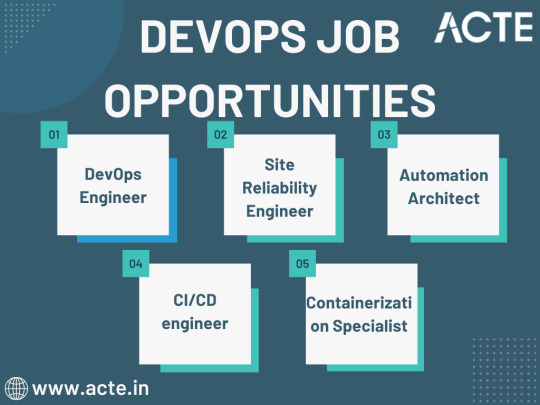
Navigating the DevOps Learning Journey
To embark on a successful DevOps career, individuals often turn to comprehensive training programs and courses that equip them with the necessary skills and knowledge. The DevOps learning journey typically involves the following courses:
1. DevOps Foundation
A foundational DevOps course covers the basics of DevOps practices, principles, and tools. It serves as an excellent starting point for beginners, providing a solid understanding of the DevOps mindset and practices.
2. DevOps Certification
Advanced certification courses are designed for those who wish to delve deeper into DevOps methodologies, CI/CD pipelines, and various tools like Jenkins, Ansible, and Terraform. These certifications validate your expertise and enhance your job prospects.
3. Docker and Kubernetes Training
Containerization and container orchestration are two essential skills in the DevOps toolkit. Courses focused on Docker and Kubernetes provide in-depth knowledge of these technologies, enabling professionals to effectively manage containerized applications.
4. AWS or Azure DevOps Training
Specialized DevOps courses tailored to cloud platforms like AWS or Azure are essential for those working in a cloud-centric environment. These courses teach how to leverage cloud services in a DevOps context, further streamlining software development and deployment.
5. Advanced DevOps Courses
For those looking to specialize in specific areas, advanced DevOps courses cover topics like DevOps security, DevOps practices for mobile app development, and more. These courses cater to professionals who seek to expand their expertise in specific domains.
As the DevOps landscape continues to evolve, the need for high-quality training and education becomes increasingly critical. This is where ACTE Technologies steps into the spotlight as a reputable choice for comprehensive DevOps training.
They offer carefully thought-out courses that are intended to impart both foundational information and real-world, practical experience. Under the direction of knowledgeable educators, students can quickly advance on their path to become skilled DevOps engineers. They provide practical insights into industrial practises and issues, going beyond theory.
Your journey toward mastering DevOps practices and pursuing a successful career begins here. In the digital realm, where possibilities are limitless and innovation knows no bounds, ACTE Technologies serves as a gateway to a thriving DevOps career. With a diverse array of courses and expert instruction, you'll find the resources you need to thrive in this ever-evolving domain.
3 notes
·
View notes
Text

So, you guys probably know what VSTS and What Azure DevOps are, as you are in this article. I suppose you have a little idea about that. No? Let me tell you in short what is VSTS and What is Azure DevOps?
What is VSTS?
VSTS (Visual Studio Team Services) was a cloud-hosted extension that was run by Microsoft and assisted development teams with special tools and services. These services were for software programmers, tester and IT project developers. Now let’s move to the next part,
What is Azure DevOps?
Azure DevOps is VSTS. Confusing, Huh? Not at all. Let me tell you, In 2018 Microsoft realized that VSTS is a very large platform where users might get confused with different tools. So they developed Azure DevOps. So now you have an idea that azure DevOps and VSTS are somewhat the same not fully but in some cases they are. According to Abel Wang, VSTS was one monolithic tool that did everything for the development of software They break VSTS into different tools, and now instead of just one monolithic tool, Microsoft has Azure Pipelines, Azure Repos, Azure Boards, Azure Artifacts, and Azure Test Plans. Now let me tell you how this works, Let’s say you have your code in GitHub and you are building it in Jenkins so won’t it be better if you use azure Pipeline? Like to release pipeline nothing will be better than Azure Pipelines. You can make your Test plans using Azure Test Plans, To track all of your work through the project you can use Azure Boards. So with the help of Azure DevOps, you can use whatever tool you want without using the Monolithic VSTS application. Also Read | Importance of Data Science in the Insurance Industry
What Differences Do They Make In Azure DevOps?
Azure DevOps is an evolution of VSTS. In 2018 Microsoft launched Azure DevOps and with that, they said that Development Operations are difficult to do and it is getting critical to a team’s success. They provided specific services to us and assured us that these tools will provide software faster and that too with higher quality. Let’s get to know these changes one by one.
Azure Pipelines
Azure Pipelines is Basically a CI/CD which works with any programming language, platform, or even a cloud. It connects with GitHub and deploys continuously.
Azure Boards
Azure Boards uses Kanban Boards, Backlogs, Team Dashboards custom reporting, and with the help of all of this Azure boards give you the exact tracking of your work.
Azure Artifacts
It gives you package feeds for different public and private sources.
Azure Repos
It is a private Git Repos for your project. By its name, it is identical that it provides a good repo to your business through Advanced file management and collaborative pull requests.
Azure Test Plans
With Azure Test Plans you will be able to do any kind of test, your one-stop solution for your Tests. All these Azure DevOps Services are open and also extensible. If you are working with a Framework, Platform, or even a cloud application, this software works smoothly for all of these. Also, it is possible that you use them separately or combined for all kinds of development solutions. As Azure supports both private and public cloud configurations, you will be able to run your data in your data center or their cloud too. It is possible and it is amazing. Also Read | Banks in the Metaverse: Why to Get In Early and 3 Ways to Start
What Kind Of Changes Will Be There In Azure DevOps?
Azure DevOps is nothing but the evolution of VSTS. The former VSTS users will get upgraded into Azure DevOps Automatically. Azure DevOps will give more choices and functions to existing users, so it is 0 loss and 100% gain for former users. The URL is changed from abc.visualstudio.com to dev.azure.com/abc. They have also made this easier for new users who just search visualstudio.com, they redirected this link to Azure DevOps.
As a part of this, the user will get an updated experience. Users of the Team Foundation Server will get updates based on features live in Azure DevOps. The Next version of TFS will be called DevOps Server and will get continue the enhanced updates and Services.
Conclusion
The change is necessary, But with Care. With this motive, Microsoft has perfectly relaunched VSTS with a new name which is Azure DevOps. Azure DevOps is a one-stop solution for every kind of Software Development. With Azure’s Pipelines, Boards, Artifacts, Repos and Test Plans you can design your application or website with ease. You can also use all of these tools in Azure DevOps simatenoiusly but you won’t be calling it VSTS. If you are building a website from a scratch you must use all of these application. It will really help your business.
Also Read
How is Google Search Implementing Artificial Intelligence?
7 Roles of Data Analytics in Video Games Development
How Artificial Intelligence can Enhance the Education Industry in 2022
Top 10 Keys Benefits of Cloud Automation in The Healthcare Industry
How Can Big Data Analytics Help Businesses to Become Data-Driven?
Original Source : Azure DevOps Is New VSTS - HData Systems
#azure#azure devops#data science#big data#visual studio#business#startups#entrepreneur#artificial intelligence#business intelligence#data analytics#data mining
6 notes
·
View notes
Text
Preparing for DevOps Certification: Self-Assessment and Skill Gap Analysis
In today's rapidly evolving tech landscape, DevOps has emerged as a crucial methodology for streamlining software development and deployment processes. With its focus on collaboration, automation, and continuous improvement, DevOps is in high demand across industries. As a result, many professionals are considering DevOps certification to validate their skills and enhance their career prospects. However, preparing for DevOps certification requires more than just memorizing information—it demands a comprehensive self-assessment and skill gap analysis. In this article, we'll explore how to effectively prepare for DevOps certification by evaluating your current skill set and identifying areas for improvement.
Understanding DevOps Certification
Before diving into preparation strategies, it's essential to understand the significance of DevOps certification. DevOps certifications, offered by organizations such as the DevOps Institute and Docker, validate an individual's expertise in various DevOps practices, tools, and methodologies. Achieving certification not only demonstrates proficiency but also enhances credibility and opens up new career opportunities. However, earning a DevOps certification requires a solid understanding of DevOps principles, practices, and tools, along with hands-on experience.
Self-Assessment: Evaluating Your Skills
The first step in preparing for DevOps certification is conducting a thorough self-assessment of your current skills and knowledge. Start by reviewing the key areas covered in the certification exam blueprint or syllabus provided by the certification body.
These areas typically include:
DevOps Culture and Practices: Assess your understanding of DevOps principles, such as continuous integration, continuous delivery, and infrastructure as code. Evaluate your familiarity with DevOps methodologies, including Agile, Lean, and ITIL.
Automation and Tools: Evaluate your proficiency in popular DevOps tools and technologies, such as Docker, Kubernetes, Jenkins, Ansible, and Terraform. Determine your ability to automate deployment pipelines, manage infrastructure, and monitor system performance.
Continuous Integration/Continuous Deployment (CI/CD): Assess your knowledge of CI/CD pipelines, version control systems (e.g., Git), and automated testing frameworks. Determine your ability to design, implement, and optimize CI/CD processes.
Cloud Platforms: Evaluate your understanding of cloud computing concepts and platforms, such as AWS, Azure, and Google Cloud Platform (GCP). Assess your ability to deploy and manage applications in cloud environments.
Monitoring and Logging: Assess your familiarity with monitoring tools (e.g., Prometheus, Grafana) and logging frameworks (e.g., ELK stack). Determine your ability to monitor system health, troubleshoot issues, and analyze performance metrics. Skill Gap Analysis: Identifying Areas for Improvement
Once you've completed the self-assessment, it's time to identify your skill gaps and areas for improvement. Reflect on your assessment results and pinpoint the areas where you feel less confident or knowledgeable. Ask yourself the following questions:
Which DevOps principles or practices do I struggle to understand or apply effectively?
Are there any specific tools or technologies that I'm unfamiliar with or have limited experience using?
Do I need to improve my skills in certain areas, such as automation, scripting, or containerization?
Are there any gaps in my knowledge of cloud platforms, infrastructure management, or security practices?
Based on your analysis, create a personalized study plan to address your skill gaps and prepare for the certification exam. This plan may include:
Enrolling in DevOps training courses or workshops to gain hands-on experience with relevant tools and technologies.
Exploring online tutorials, documentation, and case studies to deepen your understanding of DevOps concepts and practices.
Participating in DevOps community forums, meetups, and webinars to learn from industry experts and peers.
Setting up a lab environment or sandbox to practice deploying applications, configuring infrastructure, and troubleshooting issues.
Taking practice exams or quizzes to assess your progress and identify areas that require further
conclusion
Preparing for DevOps certification requires a strategic approach that begins with a thorough self-assessment and skill gap analysis. By evaluating your current skills and identifying areas for improvement, you can create a targeted study plan to enhance your expertise and confidence. Whether you're new to DevOps or seeking to advance your career, investing time and effort in preparation will not only increase your chances of success but also deepen your understanding of DevOps principles and practices. Remember, certification is just the beginning—continuous learning and professional development are essential for thriving in the dynamic field of DevOps.
0 notes
Text

Microsoft Azure DevOps
QServices provides expert Microsoft Azure DevOps services to streamline your development processes. From planning and coding to testing and deployment, our team ensures seamless integration and automation for your projects. Boost efficiency and collaboration with QServices Azure DevOps solutions.
0 notes
Text
10 Real-Time DevOps Project Ideas for Practice in 2024
In the rapidly evolving field of software development, DevOps practices have become indispensable for achieving streamlined operations and enhancing collaboration between development and operations teams. As we step into 2024, it's crucial for aspiring DevOps professionals to gain hands-on experience through real-time projects.
This guide explores eight innovative DevOps project ideas designed to bolster your skills, whether you're enrolled in a DevOps Internship Program for beginners or seeking to expand your expertise.

Continuous Integration/Continuous Deployment (CI/CD) Pipeline for a Web Application
Creating a CI/CD pipeline represents a foundational DevOps project. By automating the integration and deployment processes, you can learn how to rapidly and reliably deliver applications and services.
This project could involve setting up a Jenkins pipeline to manage the lifecycle of a simple web application, incorporating stages like build, test, and deploy.
Automated Disaster Recovery Plan
Implementing an automated disaster recovery plan is an advanced DevOps project that showcases the importance of reliability and quick recovery in the face of infrastructure failures.
This project involves creating scripts and automation tools using platforms like Ansible or Terraform to automatically restore services and applications in another environment or cloud region upon failure.
Infrastructure as Code (IaC) with Terraform
IaC is a key DevOps practice that promotes the management of infrastructure using code instead of manual processes. Using Terraform, you can write, plan, and create infrastructure across various service providers. This project could involve deploying a multi-tier application across cloud platforms, emphasizing the benefits of scalability and management efficiency.
Monitoring and Logging with Prometheus and Grafana
Monitoring and logging are critical for maintaining the health of applications and infrastructure. Implementing a monitoring solution using Prometheus, combined with visualization in Grafana, offers practical experience in tracking application performance and troubleshooting issues.
Containerization with Docker and Kubernetes
Containerization has revolutionized the way applications are developed, deployed, and scaled. By creating a project that utilizes Docker for containerization and Kubernetes for orchestration, you can understand how to manage containerized applications efficiently in production environments.
DevOps Security Integration (DevSecOps)
Integrating security into the DevOps pipeline is crucial for identifying and mitigating risks early in the development process. A project focusing on implementing automated security scans and compliance checks can provide insight into the practices of Cybersecurity &DevSecOps Training.

ChatOps Implementation for Real-Time Collaboration
ChatOps uses chatbots and messaging tools to facilitate team communication and operational tasks. Implementing a ChatOps project, such as integrating Slack with Jenkins, can help you understand how real-time communication improves collaboration and efficiency.
Cloud-Native Application Deployment
With the shift towards cloud-native development, understanding how to deploy applications in a cloud environment is essential. A project that involves deploying a microservices architecture on a cloud platform like AWS, Azure, or Google Cloud can offer hands-on experience with scalable, resilient application deployment.
Performance Tuning and Optimization
Performance tuning is crucial for ensuring applications run efficiently and cost-effectively. A project focused on analyzing and optimizing the performance of a web application, using tools like Apache JMeter, can teach valuable skills in identifying bottlenecks and improving resource utilization.
JAVA Job Support Integration
Incorporating JAVA job support in a DevOps project allows for a deeper understanding of the development side of operations. By integrating JAVA applications with DevOps tools and practices, you can gain insights into the challenges and solutions involved in continuous application development and deployment.
Conclusion
Embarking on real-time DevOps projects provides invaluable hands-on experience, preparing you for a successful career in this dynamic field. Whether you're participating in an internship, enhancing your cybersecurity knowledge, or seeking JAVA job support, these projects offer a practical way to apply and deepen your understanding of DevOps practices. By tackling these projects, you'll not only develop technical proficiency but also gain insights into the collaborative and agile nature of DevOps culture.
0 notes
Text
Full Stack Magic: Bringing Ideas to Life on the Web

Introduction
In an era dominated by digital innovations, the ability to breathe life into ideas on the web stands as a potent skill. Full-stack development emerges as the catalyst, empowering developers to craft dynamic, interactive web applications tailored to diverse user needs. Join us on a journey into the realm of web application development, where we uncover the driving forces behind full-stack development, igniting a spark of innovation and creativity in the digital landscape.
Embracing the Dynamics of Web Application Development
Web application development is the art of sculpting applications that thrive within web browsers. These applications range from sleek static websites to complex platforms offering real-time interactions and personalized experiences. The developmental journey spans planning, design, implementation, rigorous testing, and seamless deployment, ensuring a smooth user experience at every step.
The Full Stack Advantage: A Holistic Approach
Full stack development epitomizes the complete lifecycle of building a web application, encompassing front-end interfaces, back-end server logic, and robust database management. A proficient full stack developer navigates effortlessly between client-side and server-side technologies, harmonizing all layers of an application with finesse. This holistic perspective not only amplifies a developer's adaptability but also nurtures a deep understanding of application architecture, fostering effective problem-solving and innovative solutions.
Unveiling the Core Technologies in Full Stack Development
Front-End Mastery:
HTML, CSS, and JavaScript form the cornerstone of front-end development, sculpting the visual and interactive elements of web interfaces.
Dynamic frameworks such as React, Angular, and Vue.js elevate user interfaces, ensuring responsiveness and immersive user experiences.
Empowering the Back-End:
Back-end development delves into server-side scripting and meticulous database handling. Leading languages include Node.js (JavaScript), Python, Ruby, and Java.
Robust frameworks like Express.js (for Node.js), Django (for Python), and Ruby on Rails (for Ruby) empower developers to build scalable, efficient server logic.
Data Management Excellence:
SQL (Structured Query Language) and versatile NoSQL databases like MongoDB, PostgreSQL, MySQL, and Firebase serve as data repositories, ensuring seamless data management in web applications.
ORM (Object-Relational Mapping) libraries like Sequelize (for Node.js) and SQLAlchemy (for Python) streamline database interactions, safeguarding data integrity and performance.
DevOps and Deployment Dynamics:
DevOps practices, encompassing version control systems (e.g., Git), continuous integration (CI), and automated deployment (CD), optimize the development workflow, ensuring code quality and agility.
Cloud platforms such as AWS (Amazon Web Services), Azure, and Google Cloud offer scalable infrastructure, facilitating seamless hosting and deployment of web applications with heightened reliability and performance.
Unleashing Innovation with Full Stack Dynamics
The fusion of these technologies empowers developers to unleash their creative prowess, transforming conceptual ideas into fully functional web applications. Whether crafting captivating user interfaces, implementing intricate business logic, or fine-tuning performance for impeccable user experiences, full stack development presents a comprehensive toolkit for turning dreams into digital realities.
Furthermore, full stack developers' profound understanding of both front-end and back-end intricacies equips them to troubleshoot efficiently, optimize code for peak performance, and adapt swiftly to evolving technological paradigms. This versatility not only positions them as indispensable assets in the tech realm but also fosters a culture of perpetual learning and groundbreaking innovation.
Embracing the Future of Full Stack Magic
In the ever-evolving landscape of web development, full stack magic encapsulates the fusion of creativity, technical prowess, and problem-solving acumen. By harnessing a diverse array of Full Stack Development technologies and embracing the full spectrum of development responsibilities, full stack developers embark on a transformative journey, shaping the digital landscape and ushering in an era of unparalleled technological innovation.
Suggested blogs: -
Web Development Technologies
Full stack technologies
UX optimization strategies
0 notes
Text
Driving Innovation: A Case Study on DevOps Implementation in BFSI Domain
Banking, Financial Services, and Insurance (BFSI), technology plays a pivotal role in driving innovation, efficiency, and customer satisfaction. However, for one BFSI company, the journey toward digital excellence was fraught with challenges in its software development and maintenance processes. With a diverse portfolio of applications and a significant portion outsourced to external vendors, the company grappled with inefficiencies that threatened its operational agility and competitiveness. Identified within this portfolio were 15 core applications deemed critical to the company’s operations, highlighting the urgency for transformative action.
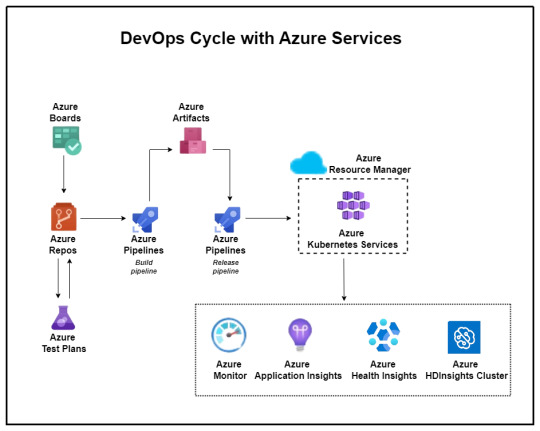
Aspirations for the Future:
Looking ahead, the company envisioned a future state characterized by the establishment of a matured DevSecOps environment. This encompassed several key objectives:
Near-zero Touch Pipeline: Automating product development processes for infrastructure provisioning, application builds, deployments, and configuration changes.
Matured Source-code Management: Implementing robust source-code management processes, complete with review gates, to uphold quality standards.
Defined and Repeatable Release Process: Instituting a standardized release process fortified with quality and security gates to minimize deployment failures and bug leakage.
Modernization: Embracing the latest technological advancements to drive innovation and efficiency.
Common Processes Among Vendors: Establishing standardized processes to enhance understanding and control over the software development lifecycle (SDLC) across different vendors.
Challenges Along the Way:
The path to realizing this vision was beset with challenges, including:
Lack of Source Code Management
Absence of Documentation
Lack of Common Processes
Missing CI/CD and Automated Testing
No Branching and Merging Strategy
Inconsistent Sprint Execution
These challenges collectively hindered the company’s ability to achieve optimal software development, maintenance, and deployment processes. They underscored the critical need for foundational practices such as source code management, documentation, and standardized processes to be addressed comprehensively.
Proposed Solutions:
To overcome these obstacles and pave the way for transformation, the company proposed a phased implementation approach:
Stage 1: Implement Basic DevOps: Commencing with the implementation of fundamental DevOps practices, including source code management and CI/CD processes, for a select group of applications.
Stage 2: Modernization: Progressing towards a more advanced stage involving microservices architecture, test automation, security enhancements, and comprehensive monitoring.
To Expand Your Awareness: https://devopsenabler.com/contact-us
Injecting Security into the SDLC:
Recognizing the paramount importance of security, dedicated measures were introduced to fortify the software development lifecycle. These encompassed:
Security by Design
Secure Coding Practices
Static and Dynamic Application Security Testing (SAST/DAST)
Software Component Analysis
Security Operations
Realizing the Outcomes:
The proposed solution yielded promising outcomes aligned closely with the company’s future aspirations. Leveraging Microsoft Azure’s DevOps capabilities, the company witnessed:
Establishment of common processes and enhanced visibility across different vendors.
Implementation of Azure DevOps for organized version control, sprint planning, and streamlined workflows.
Automation of builds, deployments, and infrastructure provisioning through Azure Pipelines and Automation.
Improved code quality, security, and release management processes.
Transition to microservices architecture and comprehensive monitoring using Azure services.
The BFSI company embarked on a transformative journey towards establishing a matured DevSecOps environment. This journey, marked by challenges and triumphs, underscores the critical importance of innovation and adaptability in today’s rapidly evolving technological landscape. As the company continues to evolve and innovate, the adoption of DevSecOps principles will serve as a cornerstone in driving efficiency, security, and ultimately, the delivery of superior customer experiences in the dynamic realm of BFSI.
Contact Information:
Phone: 080-28473200 / +91 8880 38 18 58
Email: [email protected]
Address: DevOps Enabler & Co, 2nd Floor, F86 Building, ITI Limited, Doorvaninagar, Bangalore 560016.
#BFSI#DevSecOps#software development#maintenance#technology stack#source code management#CI/CD#automated testing#DevOps#microservices#security#Azure DevOps#infrastructure as code#ARM templates#code quality#release management#Kubernetes#testing automation#monitoring#security incident response#project management#agile methodology#software engineering
0 notes
Text
Azure devops test plans best practices
Azure DevOps Test Plans is a powerful tool for managing software testing, but to get the most out of it, it's important to follow best practices. Here are a few key practices to keep in mind:
Organize your test cases effectively: Create a clear and consistent naming convention for your test cases and organize them into logical groups or test suites. This makes it easier to find and manage your test cases and ensures that your testing efforts are well-structured.
Use parameters and shared steps: To minimize duplication of effort, use parameters to create reusable test cases that can be easily modified for different scenarios. Shared steps can also be used to avoid duplicating steps across multiple test cases, making maintenance and updates easier.
Automate where possible: Automating tests using frameworks like Selenium or Appium can save time and reduce the risk of human error. However, it's important to balance the effort involved in creating and maintaining automated tests with the benefits they provide.
Use exploratory testing: Exploratory testing is a valuable complement to scripted testing, as it allows testers to explore software behavior and identify issues that may not have been captured in test cases. Encourage your team to use exploratory testing as part of their testing process.
Monitor and analyze test results: Use Azure DevOps' built-in reporting and analytics features to monitor test results and identify trends and patterns. This can help you identify areas where your testing process can be improved and track progress over time.
By following these things, you can get the most out of Azure DevOps Test Plans practices and ensure that your software testing efforts are well-structured, efficient, and effective.
0 notes
Text
Key benefits of obtaining the Azure DevOps certification
Azure DevOps is a powerful set of tools and services that can help you collaborate and manage the development of your applications, from planning to deployment. With the Azure DevOps certification, you can demonstrate your expertise in using Azure DevOps to manage code, builds, and releases, and to implement continuous integration and continuous deployment.
The certification exam covers a wide range of topics, including Azure Boards, Azure Repos, Azure Artifacts, Azure Test Plans, and Azure DevOps Server. To prepare for the exam, you can take online courses, attend training sessions, and practice with hands-on labs.
One of the key benefits of obtaining the Azure DevOps certification is that it shows employers that you have the knowledge and skills to help them implement DevOps practices in their organizations. DevOps is a methodology that emphasizes collaboration and communication between development and operations teams, and it is becoming increasingly important as organizations move to cloud-based infrastructure and services.
With the Azure DevOps certification, you will be able to showcase your knowledge and skills in cloud-based development and operations, and you will be in high demand by employers looking for professionals who can help them implement DevOps practices in their organizations.
In addition to the career advancement opportunities, obtaining the Azure DevOps certificationcan also help you stay current with the latest developments in the field and improve your professional credibility. It also can open the door for you to work with other Microsoft Azure services and technologies.
Overall, the Azure DevOps certification is a valuable asset for any IT professional looking to advance their career in cloud-based development and operations. So, if you want to take your career to the next level, don't miss this opportunity and get certified in Azure DevOps today!
#Azure DevOps#Microsoft Azure#Cloud computing#DevOps#Certification#Exam#Microsoft Certified: Azure DevOps Engineer Expert#Azure Boards#Azure Repos#Azure Artifacts#Azure Test Plans#Azure Pipelines#Continuous integration
0 notes
Text
From Planning to Deployment: A Deep Dive into Azure DevOps
In the ever-evolving landscape of software development, efficient collaboration, seamless integration, and automated workflows are paramount for successful project delivery. Azure DevOps, Microsoft's comprehensive suite of development tools, provides a powerful solution that covers the entire software development lifecycle. This blog will take you on a journey from planning to deployment, exploring the key features and best practices within Azure DevOps.
DevOps Training In Coimbatore Where traditional boundaries fade, and a unified approach to development and operations emerges.
At its core, Azure DevOps combines a range of services that are designed to work seamlessly together. Let's take a closer look at some of the key components and how they work.
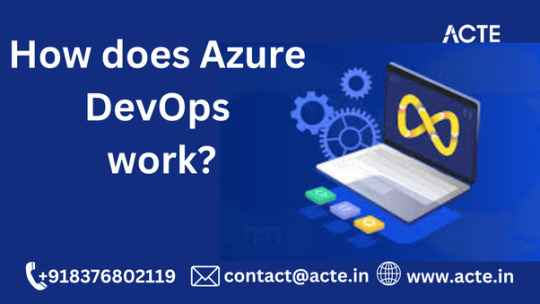
Unveiling the Magic of Azure DevOps
Azure Boards: This is the project management tool within Azure DevOps. It allows teams to plan, track, and discuss work across the development process. With Azure Boards, you can create and manage work items such as user stories, bugs, and tasks. It also provides advanced features like Kanban boards, backlogs, and sprint planning.
Azure Repos: This is the version control system in Azure DevOps. It supports Git as well as Team Foundation Version Control (TFVC). Azure Repos allows you to securely store and manage your source code repositories. It provides features like branching, merging, pull requests, and code reviews. You can also integrate it with popular code editors like Visual Studio Code or IntelliJ IDEA. To master the intricacies of DEVOPS and unlock its full potential, individuals can benefit from enrolling in the DevOps online course.
Azure Pipelines: This is the continuous integration and delivery (CI/CD) tool in Azure DevOps. It enables you to automate your applications' build, test, and deployment across multiple platforms and environments. With Azure Pipelines, you can define pipelines as code using YAML or use a visual designer. It supports various programming languages, frameworks, and platforms.
Azure Test Plans: This is the testing tool in Azure DevOps. It allows you to plan, track, and manage your testing efforts. You can create test plans, suites, and test cases to ensure the quality of your software. Azure Test Plans integrates with popular test frameworks like Selenium or NUnit for automated testing.
Azure Artifacts: This is the package management tool in Azure DevOps. It allows you to create, host, and share packages across your organization. Whether it's a library, a container image, or a NuGet package, Azure Artifacts provides a secure and reliable way to manage your artifacts.
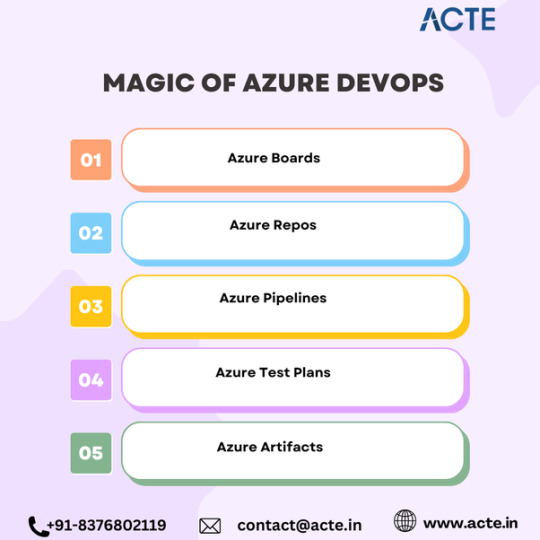
In addition to these core services, Azure DevOps also provides a range of extensions and integrations with other tools and services such as Azure Monitor for application insights, Azure Kubernetes Service for container orchestration, and Azure Logic Apps for workflow automation.
To get started with Azure DevOps, you can sign up for a free account on the Azure DevOps website. Microsoft also offers various learning resources including documentation, tutorials, and videos to help you get up to speed quickly.
Azure DevOps offers a comprehensive solution for modern software development, enabling teams to seamlessly move from planning to deployment with efficiency and confidence. By understanding the various components and best practices outlined in this blog, you can harness the full power of Azure DevOps to streamline your development process and deliver high-quality software.
0 notes
Text

"Elevate your software development lifecycle with our Azure DevOps training program. Designed for developers, IT professionals, and project managers, our courses provide a deep dive into the powerful tools and capabilities of Azure DevOps. Learn how to streamline collaboration, automate workflows, and accelerate the delivery of high-quality software products using Azure Boards, Repos, Pipelines, Test Plans, and Artifacts. Gain hands-on experience in configuring CI/CD pipelines, managing code repositories, tracking work items, and implementing agile methodologies. Whether you're looking to optimize team productivity, improve software quality, or enhance deployment efficiency, our expert-led training equips you with the skills and knowledge to succeed in today's fast-paced DevOps environment."
Register soon only a limited slots are available You are invited to a Zoom meeting on Mar 2, 2024, 08:00 PM. Register in advance for this meeting: https://lnkd.in/dtfPrc7c
0 notes
Text
Harnessing the Cloud: Developing and Deploying Software in AWS, Azure, and Google Cloud
In today's digital landscape, the cloud has become the backbone of modern software development and deployment. Cloud computing platforms like Amazon Web Services (AWS), Microsoft Azure, and Google Cloud offer developers unparalleled flexibility, scalability, and reliability. Harnessing the power of these platforms has become essential for organisations looking to innovate and stay competitive in a rapidly evolving market.
Developing and deploying software in the cloud involves a series of steps and best practices to ensure optimal performance, security, and cost-effectiveness. Let's explore how developers can leverage AWS, Azure, and Google Cloud to build and deploy software efficiently.
Understanding Cloud Computing Platforms
AWS, Azure, and Google Cloud are three major players in the cloud computing market, each offering a comprehensive suite of services and tools for building, deploying, and managing applications. These platforms provide infrastructure as a service (IaaS), platform as a service (PaaS), and software as a service (SaaS) offerings, catering to a wide range of use cases and industries.
Developing Software in the Cloud
One of the key advantages of cloud computing is the ability to access scalable computing resources on-demand. Developers can leverage virtual machines, containers, serverless computing, and managed services to build and test their applications. For example, AWS provides services like Amazon EC2 for virtual servers, AWS Lambda for serverless computing, and Amazon RDS for managed databases.
Similarly, Azure offers Azure Virtual Machines, Azure Functions, and Azure SQL Database, while Google Cloud provides Compute Engine, Cloud Functions, and Cloud SQL. By using these cloud services, developers can focus on writing code without worrying about provisioning and managing underlying infrastructure.
Deploying Software to the Cloud
Deploying software to the cloud involves packaging and distributing applications to cloud environments for production use. Cloud providers offer various deployment options, including manual deployments, continuous integration and continuous deployment (CI/CD) pipelines, and infrastructure as code (IaC) tools.
CI/CD pipelines automate the process of building, testing, and deploying software, allowing developers to release new features and updates quickly and consistently. Tools like AWS CodePipeline, Azure DevOps, and Google Cloud Build enable teams to streamline their deployment workflows and improve collaboration across development and operations teams.
Best Practices for Cloud Development and Deployment
When developing and deploying software in the cloud, it's essential to follow best practices to ensure security, performance, and cost efficiency. Some key best practices include:
Security: Implementing robust security measures to protect sensitive data and infrastructure. This includes encrypting data, managing access controls, and regularly patching and updating software components.
Scalability: Designing applications to scale horizontally and vertically based on demand. Leveraging auto-scaling capabilities offered by cloud providers to automatically adjust resources to meet changing workload requirements.
Monitoring and Logging: Utilizing monitoring and logging services to gain insights into application performance and troubleshoot issues proactively. Services like AWS CloudWatch, Azure Monitor, and Google Cloud Logging provide real-time visibility into application metrics and logs.
Cost Optimization: Optimizing resource usage and leveraging cost-effective pricing models to minimize cloud spending. This includes rightsizing instances, using reserved instances or savings plans, and implementing resource tagging for cost allocation.
Conclusion
Harnessing the cloud for developing and deploying software offers numerous benefits, including scalability, flexibility, and efficiency. By leveraging the capabilities of cloud computing platforms like AWS, Azure, and Google Cloud, developers can accelerate innovation, improve collaboration, and deliver value to their customers faster than ever before. Embracing cloud-native development practices and following best practices ensures successful outcomes in the cloud-first era of software development.
#software development company#software development services#Software services provider#Software development solutions
0 notes
Text
Unlocking the Power of DevOps on Azure: A Comprehensive Guide
In today's rapidly evolving technological landscape, the adoption of DevOps practices has become imperative for organizations striving to deliver high-quality software at a faster pace. Microsoft Azure, with its robust suite of cloud services, provides an ideal platform for implementing and maximizing the benefits of DevOps. This comprehensive guide will walk you through the key components, best practices, and tools available on Azure to unlock the full potential of DevOps.
Azure Overview
Azure is Microsoft's cloud computing platform, providing a wide range of services to help organizations build, deploy, and manage applications. When combined with DevOps practices, Azure becomes a powerful tool for achieving continuous integration and continuous delivery (CI/CD)."In the world of continuous improvement, DevOps training in Hyderabad is the compass that guides your team towards efficiency and innovation."
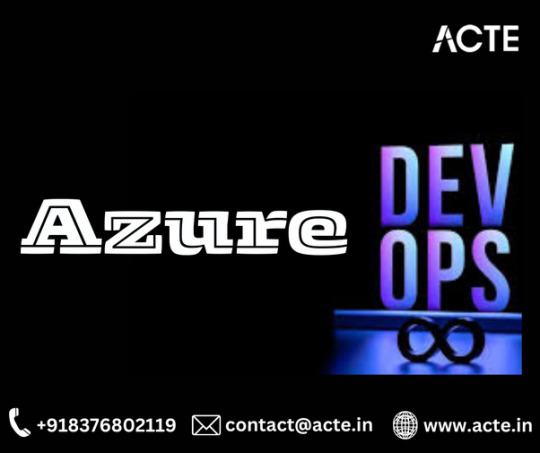
Integration with DevOps
Azure seamlessly integrates with popular DevOps tools and services, creating a robust ecosystem for application development. This integration ensures that development teams can leverage Azure's capabilities to streamline processes, automate tasks, and deliver software faster and more reliably.
Understanding DevOps on Azure
DevOps on Azure is a collaborative and streamlined approach to software development and IT operations, leveraging Microsoft's cloud computing platform, Azure. It combines the principles of DevOps with the robust features of Azure to enhance the entire development lifecycle.
1. Collaborative Development:
DevOps on Azure promotes collaboration between development and operations teams. It breaks down silos, fostering a culture where both teams work together seamlessly to achieve common goals.
2. Azure DevOps Services:
Azure offers a suite of tools known as Azure DevOps Services, covering version control, build automation, release management, and more. These services act as a central hub, providing a unified platform for efficient project planning, tracking, and execution.
3. Continuous Integration and Delivery (CI/CD):
Azure Pipelines, a key component, automates the build, test, and deployment processes, enabling teams to achieve continuous integration and continuous delivery. This results in faster and more reliable software releases.
4. Version Control with Azure Repos:
Azure Repos, integrated with Azure DevOps, provides robust version control supporting Git and TFVC. It ensures effective source code management and collaboration, crucial for a smooth development workflow.
5. Project Management with Azure Boards:
Azure Boards facilitates agile project management, allowing teams to plan sprints, track work progress, and manage backlogs. This ensures visibility and transparency throughout the development cycle.
"Break free from limitations. Our DevOps online course empowers you to upscale your skills, all from the comfort of your home."
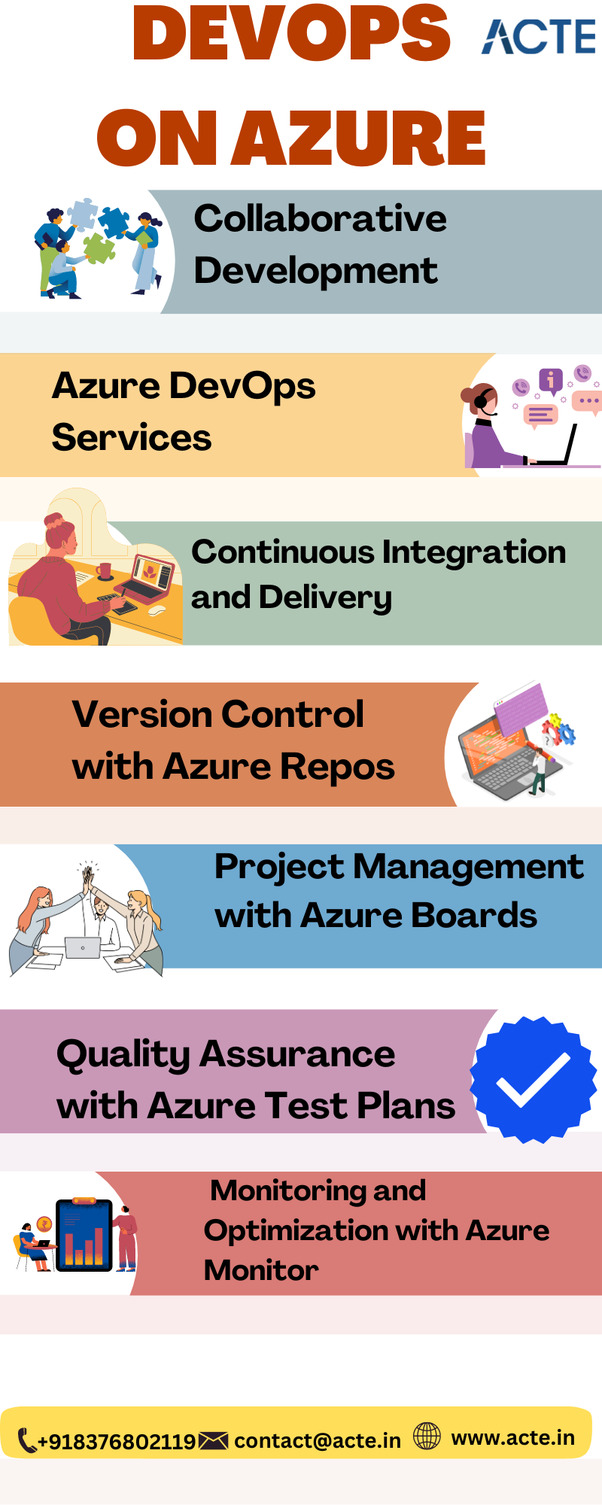
6. Quality Assurance with Azure Test Plans:
DevOps on Azure includes Azure Test Plans, a testing tool that assists teams in planning, tracking, and managing testing efforts. This ensures the quality and reliability of applications before deployment.
7. Monitoring and Optimization with Azure Monitor:
Azure Monitor provides comprehensive insights into the performance and health of applications and infrastructure. This monitoring solution allows proactive identification and resolution of issues, contributing to a more stable and reliable system.
Summarize the key takeaways from the guide, emphasizing the seamless integration of DevOps practices on Microsoft Azure. Encourage organizations to leverage the powerful combination of Azure's cloud services and DevOps principles to enhance agility, collaboration, and overall software delivery capabilities.
0 notes